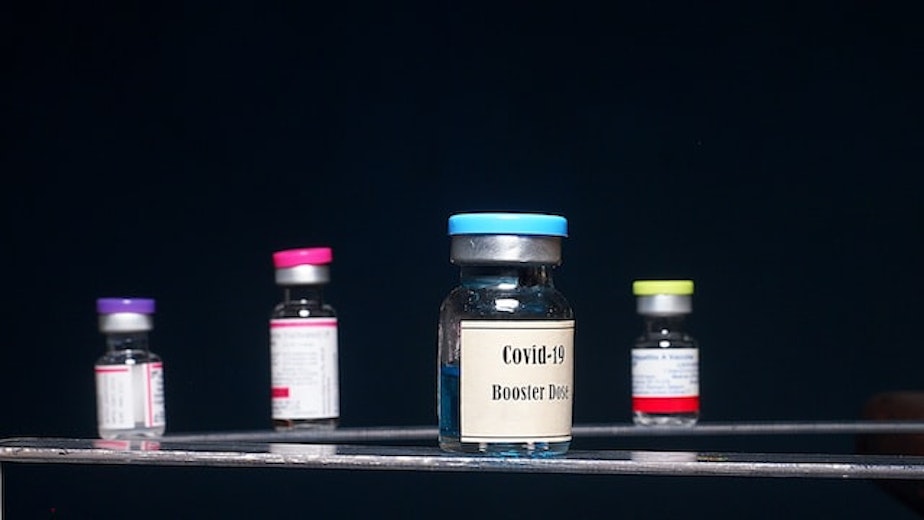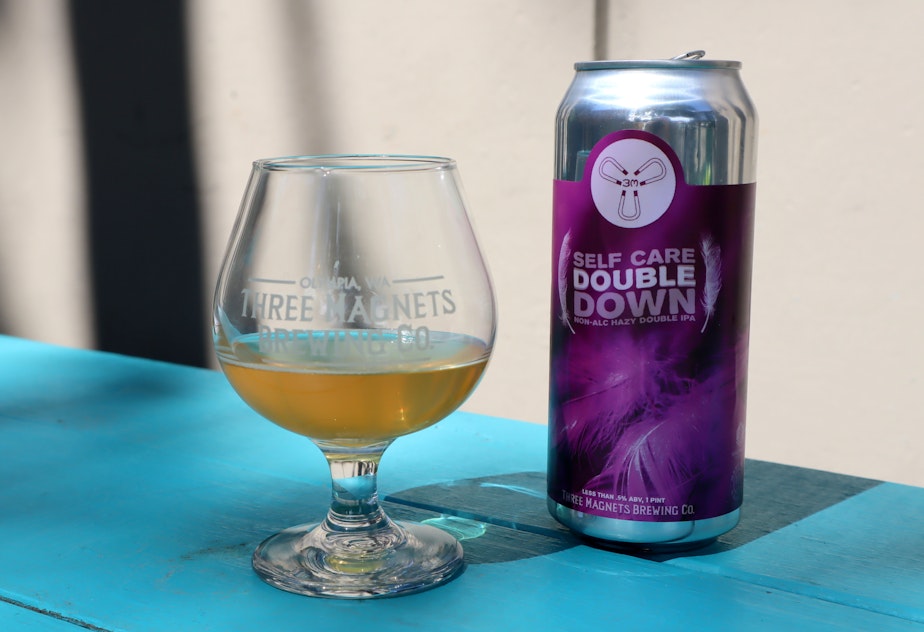Booster shots and Covid 'normalcy': Today So Far

- The West Seattle Bridge reopens this weekend.
- Seattle students went back to class today.
- We're not there yet, but with updated Covid booster shots, Covid "normalcy" could be around the corner.
This post originally appeared in KUOW's Today So Far newsletter for September 14, 2022.
What a difference a few hours can make! After this newsletter was sent out yesterday, Seattle's teachers union ended its strike after educators reached a tentative agreement with Seattle Public Schools. That means the first day of class is ... this morning. Kids are already back in school.
The teachers agreed to halt their strike, but still have to vote on the tentative agreement. That should be interesting to watch. The move to end the strike only passed by a narrow margin — 57% (78% of union members showed up to vote). Some teachers are skeptical of the proposed agreement, saying pay raises don't keep up with inflation. The exact details of the agreement have not been released. What is known is that it is a three-year contract with a pay bump. Special education student/teacher ratios will either be improved or maintained. Mental health staffing is to be added to every school. KUOW's Ann Dornfeld has more details here.
The road into Seattle is either about to get more congested, or a bit better...I'm actually not quite sure. But what I do know is that the West Seattle Bridge is coming back online after a two-year hiatus for repairs. This means tens of thousands (or about 100,000) drivers who have been stuck in West Seattle this whole time are about to be unleashed onto the commute.
Sunday is the big opening day. Seattle leaders are holding a press conference on Friday to highlight the occasion. That's more of a moment to pat themselves on the back. I think the general attitude for the rest of Seattle is, "Yeah, yeah, just open the #&$% bridge!" In the meantime, and more importantly, the city is running a few final tests to make sure the bridge is ready — crews are basically running extremely heavy loads over the bridge to see if it holds up. The bridge is also getting a bit of a facelift in these few remaining days. More details here.
I think we've all been expecting something like this to be said eventually: With the new omicron-updated booster shot, we are heading into a new era, one with annual updated shots similar to how we treat the flu.
Sponsored
That was the message that UW Medicine's Dr. Shireesha Dhanireddy recently delivered to Seattle Now. Dr. Dhanireddy notes that the previous Covid boosters were simply the same shots as the initial vaccines. The idea was to just keep immunity up. But the new boosters, available now, have been updated to account for mutations like the omicron variant. This is what we've been doing for the flu for years — we update the vaccine each year to keep the flu down as much as possible while helping ourselves overcome the illness should we be infected. That's essentially the annual scenario we are looking at with Covid.
"We are not quite there in terms of yearly vaccines for Covid, but we are edging toward that kind of normalcy with Covid, and thinking of this first round of reworked vaccines in that way," Dr. Dhanireddy said.
Officials are encouraging those most at risk to get their boosters as soon as possible, but they are open to all at this point. I already checked with my local pharmacy and they have them ready to go. Read more here.
AS SEEN ON KUOW

Sponsored
Half a dozen Pacific Northwest craft breweries are diversifying into making nonalcoholic beer. But instead of brewing bland and watery "near beer," they're injecting quality and variety into a space that used to be dominated by a few national brands. A swelling customer base is lapping it up. (Northwest News Network)
DID YOU KNOW?
The "Star-Spangled Banner" was written on this day, Sept. 14, in 1814 by Francis Scott Key.
I grew up with the impression that this patriotic song was tied to the revolution of the 1770s. I think a lot of folks have that impression. But what we know as the "Star-Spangled Banner" song was actually pieced together over decades. The words were written as a poem titled "Defence of Fort M’Henry" following the War of 1812. The poem references a battle at Fort McHenry in Baltimore, not the Revolutionary War. The poem was printed in newspapers at the time, because newspapers used to do cool things like print poetry.
What happened next is somewhat ironic. The War of 1812 was against the British. At some point, someone put Key's poem to an English drinking song that already existed. "To Anacreon in Heaven" was the official song of the London-based Anacreontic Society (basically a high-society gentleman's club in the 1700s). Over the 1800s, folks started referring to it as the "Star Spangled Banner." It floated around for a few generations until 1916 when President Wilson ordered that it be played before all official events, which is how it evolved into that song before sports games and such. It officially became the national anthem in 1931.
Sponsored
ALSO ON OUR MINDS

How NPR decided whose voices to include in stories on the FBI search of Mar-a-Lago
In the week after the FBI searched former President Donald Trump's home, NPR and other newsrooms faced a common challenge: With the government silent, the loudest voices speaking publicly about the search were Trump and his defenders. Some of their statements were false. Some espoused deep-state conspiracy theories. Almost all of it was opinion and speculation.

